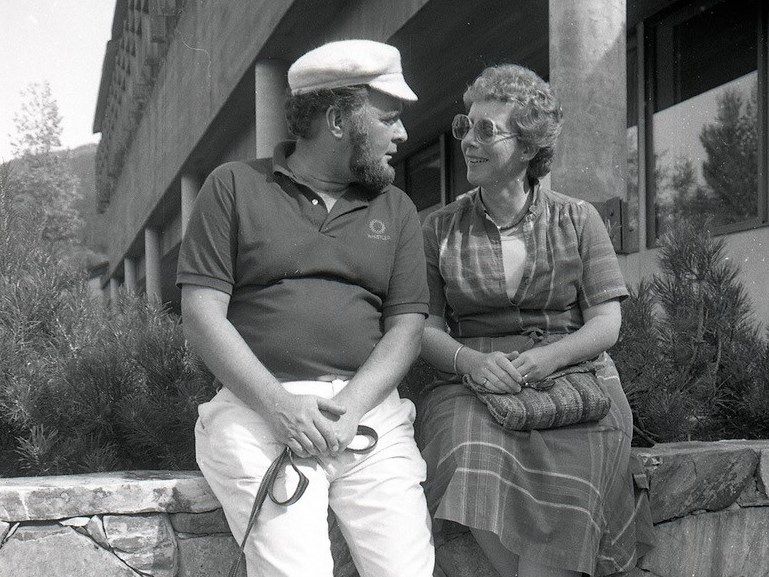I can’t help but feel a certain kinship with Paul Burrows, the dogged founder of The Whistler Question, among many other local accomplishments.
I cut my teeth at the Question, my very first “real-person” job out of journalism school, and got to watch it evolve into its next iteration after Glacier Media purchased Pique Newsmagazine in 2013 and merged the two newsrooms. I was also there, in 2018, to bear witness to the Question’s final issue, the end of an era that began in 1976 out of the basement of Paul and his wife Jane’s Alpine Meadows basement.
I will never forget the first time I saw the Question’s inaugural issue, those yellowing sheets of mimeographed paper staring back at me from behind glass. To my young and naïve Millennial brain, steeped in the modernities of digital journalism, those stapled-together pages jammed with line after line of text may as well have been an ancient artifact, recovered from a dusty dig site long forgotten.
In that moment, it struck me like a lightning bolt: I am part of a larger whole, another link in a long chain of curious reporters and storytellers who have contributed in their own ways to the interpretation and understanding of this unique little ski town.
Suddenly, I grasped the immense responsibility that came with the job, a recognition that I’ve tried to carry on throughout my career.
Getting to tell other people’s stories is a privilege I will never take for granted, and it’s one that Burrows understood deeply from the get-go. As Glenda Bartosh, who worked for Burrows as a cub reporter in the early ‘80s before purchasing the paper from him and his wife, told me last week, following his death, that no story was “too little or too corny” for him. “Everybody had a story to tell and they were all important.” (Check out Bartosh’s beautiful, poignant cover feature, which will go live online on Sunday, March 26, for more on Burrows’ unparalleled life.)
Reading back through Burrows’ pointed writings, you soon realize many of the same stories we tell ourselves today about Whistler are largely different versions of the same stories told half a century ago.
At the heart of Whistler’s modern makeup, then as in now, is a question that will continue to be asked for generations: how do we avoid killing the very qualities of this special place that made it so appealing to begin with? Burrows, for all his stubborn opinions, understood something about Whistler’s potential that many of the cabin-squatting ski bums of the ’70s and ’80s didn’t (or at least weren’t willing to admit in those heady times). He foresaw the ski boom that was to come, and the inherent benefit of developing a pedestrian-only village (on the former site of the town dump, no less) that could accommodate the waves of visitors that were still a long way off.
“We were quite countercultural in those days, and he definitely could rub us hippies the wrong way with his pro-development stance,” remembers long-time local and Whistler Search and Rescue manager Brad Sills.
That tug of war between nature and development, progress and the status quo, continues to this day in Whistler, and no matter where you land on that particular debate, we have the Burrows of the world to thank for beginning the conversation.
They say those who ignore their history are doomed to repeat it, and Whistler is probably more susceptible to this powerful, inevitable force than most other communities. Most people come here for a good time, not a long time, so it’s typically only those who end up staying for the long haul who are motivated to learn about Whistler’s unlikely journey from a tiny hippie enclave to a mammoth ski-tourism machine (and even fewer are motivated to go farther back than that, to the centuries of shared history of the Lil’wat7úl and Skwxwú7mesh on these lands).
This was another thing Burrows well understood. Speaking to Pique in a 2001 interview about his inability to establish a retirement centre in Whistler, he said, “In a normal town, losing the old people would be a disaster. But even Whistler will be unable to retain any continuity. You cannot look forward if you have lost the ability to look back.”
As we see flocks of long-time locals leave town, along with the institutional memory they possess, perhaps it’s time to follow in the footsteps of Burrows and the other giants upon which Whistler was built. We spend a lot of time and energy in this town looking ahead, which is part and parcel of an ever-evolving destination resort that aims to maintain its place at the top of the ski world. But looking back is just as important, if not more so, if we want to break the cycle of history repeating itself.





